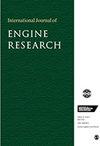Control of combustion distributions in compression-ignition engines using rate-constrained model predictive control with reference preview
IF 2.1
4区 工程技术
Q2 ENGINEERING, MECHANICAL
引用次数: 0
Abstract
To support the transition toward sustainable alternative fuels, advanced combustion control strategies can enable operation of compression-ignition engines with a wide range of fuels under challenging inlet conditions. This work presents a rate-constrained model predictive controller that uses state estimate feedback and integral tracking to control combustion phasing distributions by coordinating fuel injection timing with the power supplied to an electrically heated in-cylinder ignition assist device. The controller was validated in simulation using a statistical virtual engine that replicates both transient and steady-state stochastic combustion behavior. This virtual engine was tuned with data from experiments conducted at a low pressure-temperature inlet condition that induced highly variable combustion behavior akin to operating with a low cetane fuel. The controller achieves rapid tracking of combustion phasing step commands by supplying ignition assist power when needed to support fuel injection timing. All the while, it maintains closed-loop combustion variability at less than 6% higher than the open-loop system variability, and enforces ignition assist power range and rate constraints to reduce thermo-mechanical stress on the actuator. Furthermore, reference tracking is ensured even if combustion sensitivity to the ignition assist actuator deviates by as much as 83% from the controller’s internal model, without the need for retuning control parameters. Finally, the controller can coordinate actuators early and speed up tracking when a reference trajectory is previewed ahead of time, and its horizons can be tuned in a manner that maintains desirable control performance without compromising on computational tractability.利用速率受限模型预测控制和参考预览控制压燃式发动机的燃烧分布
为支持向可持续替代燃料过渡,先进的燃烧控制策略可使压燃式发动机在具有挑战性的进气条件下使用多种燃料。本研究提出了一种速率受限的模型预测控制器,该控制器使用状态估计反馈和积分跟踪,通过协调燃料喷射时机和提供给电加热缸内点火辅助装置的功率来控制燃烧相位分布。该控制器使用统计虚拟发动机进行仿真验证,该虚拟发动机复制了瞬态和稳态随机燃烧行为。该虚拟发动机根据在低压-低温入口条件下进行的实验数据进行了调整,该实验诱发了与使用低十六烷值燃料类似的高度多变的燃烧行为。控制器通过在需要时提供点火辅助功率以支持燃油喷射定时,实现了对燃烧相位步进指令的快速跟踪。同时,它还能将闭环燃烧变化率保持在开环系统变化率的 6% 以下,并强制执行点火辅助功率范围和速率限制,以减少执行器上的热机械应力。此外,即使点火辅助执行器的燃烧灵敏度与控制器内部模型的偏差高达 83%,也能确保参考跟踪,而无需重新调整控制参数。最后,在提前预览参考轨迹的情况下,控制器可以提前协调致动器并加快跟踪速度,其水平线的调整方式既能保持理想的控制性能,又不影响计算的可操作性。
本文章由计算机程序翻译,如有差异,请以英文原文为准。
求助全文
约1分钟内获得全文
求助全文
来源期刊

International Journal of Engine Research
工程技术-工程:机械
CiteScore
6.50
自引率
16.00%
发文量
130
审稿时长
>12 weeks
期刊介绍:
The International Journal of Engine Research publishes high quality papers on experimental and analytical studies of engine technology.
 求助内容:
求助内容: 应助结果提醒方式:
应助结果提醒方式:


